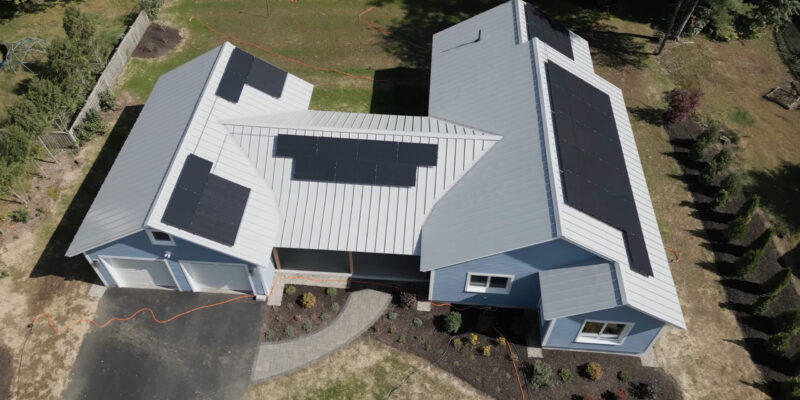Solar panels are a reliable source of energy, but their effectiveness during a power outage depends on the setup. During a power outage, grid-tied systems without batteries will not work. However, systems with battery storage can continue to supply power.
- Grid-Tied Systems: These systems are connected to the electricity grid and often do not have battery storage.
- Off-Grid Systems: These operate independently from the grid and typically include battery storage.
- Hybrid Systems: These systems are connected to the grid and include battery storage.
How to Prepare for Outage?
In a standard grid-tied system, solar panels stop producing electricity during an outage for safety reasons. This prevents backfeeding electricity into the grid, which can be dangerous for utility workers. Systems with battery storage or special inverters can still function. Planning and proper equipment are crucial. Here’s what you need to know.
Select the Right System
To ensure power during an outage, consider installing a solar system with battery storage or a hybrid system. This allows for energy independence and provides a backup power source.
- Battery Storage: These systems store excess energy produced by your solar panels for use during outages.
- Inverter Selection: A hybrid inverter can disconnect from the grid during an outage and supply power directly from the panels and batteries.
Regular Maintenance and Upgrades
Maintaining your solar panel system ensures it operates efficiently, especially during an outage. Regular cleaning of panels, checking connections, and updating software are essential. Consider upgrading older systems with new technology like smart inverters for improved performance.
Secure the Emergency Power
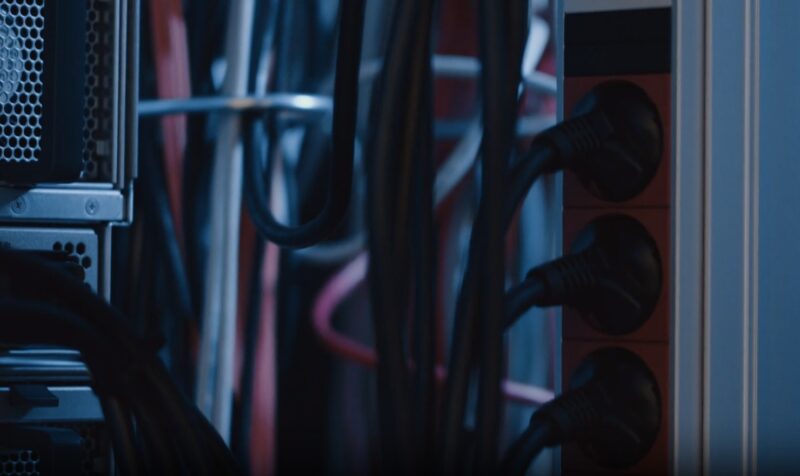
Solar panels can be a lifeline during emergencies. Here’s how to maximize their benefits.
Learn More About Energy Management
During an outage, managing energy consumption is key. Prioritize essential appliances and consider energy-efficient options to extend battery life.
While solar energy provides a sustainable path forward, understanding the role of traditional energy sources highlights the importance of a balanced energy mix in today’s world. In this context, it’s crucial to acknowledge that our reliance on conventional energy sources is increasingly becoming a matter of the past, as these resources are on borrowed time due to their environmental impact and finite availability.
- Energy-Efficient Appliances: These reduce the overall power consumption, allowing the system to power essential items longer.
- Prioritization: Focus on critical needs like refrigeration, lighting, and communication devices.
Expand Capacity for Longer Outages
For prolonged outages, expanding your system’s capacity can be beneficial. Adding more panels or batteries can provide additional power, ensuring a longer duration of energy independence.
- Additional Solar Panels: Increases the energy generation capacity of your system.
- Extra Battery Storage: Allows for more energy to be stored for use during extended outages.
Integrate the Panels with Home Energy Systems
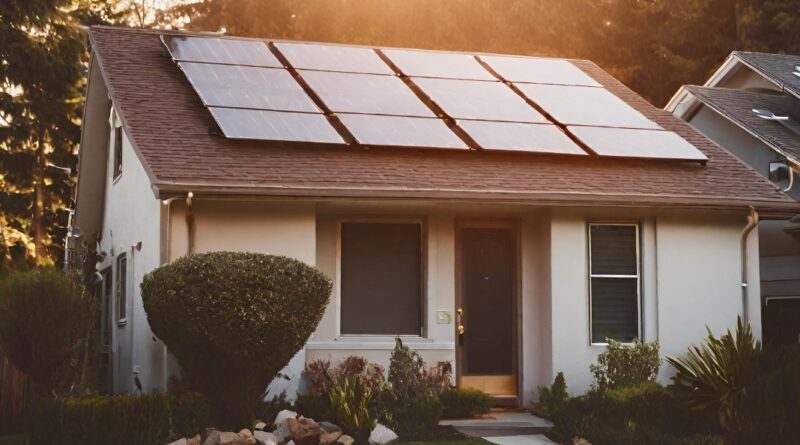
For optimal use during power outages, integrating the panels into your home energy system is crucial. This section covers the necessary steps and considerations.
How to Do It?
Integrating the panels with your home’s energy system requires careful planning. This includes selecting the right type of solar panels, inverters, and battery storage that are compatible with your home’s electrical setup.
- Professional Installation: Hiring experienced professionals ensures safe and efficient integration.
- System Compatibility: Check that your solar panels, inverter, and batteries are compatible with your home’s existing electrical system.
Smart Energy Management
Modern systems can be paired with smart energy management systems. These systems allow you to monitor and control energy usage, optimizing the efficiency of your panels during an outage.
- Energy Monitoring: Keep track of your energy production and consumption in real-time.
- Automated Controls: Set preferences for how and when to use your stored energy during an outage.
| Benefit | Description |
|---|---|
| Energy Independence | Solar panels with battery storage provide energy independence, ensuring access to power during grid outages. |
| Reduced Electricity Costs | Using solar energy reduces reliance on the grid, cutting down electricity bills and saving money over time. |
| Environmentally Friendly | The energy is clean and renewable, reducing your carbon footprint and environmental impact. |
| Increased Property Value | Homes equipped with solar panel systems can see an increase in property value. |
| Reliable Energy Source | Panels provide a reliable source of energy, especially crucial during emergencies and power outages. |
| Energy Management | Modern systems with smart energy management allow for efficient use and monitoring of solar energy. |
| Long-Term Savings | Initial investment leads to long-term savings through reduced energy costs and potential incentives. |
| Emergency Preparedness | Having this system ensures preparedness for unexpected power outages, providing peace of mind. |
Be Cautious
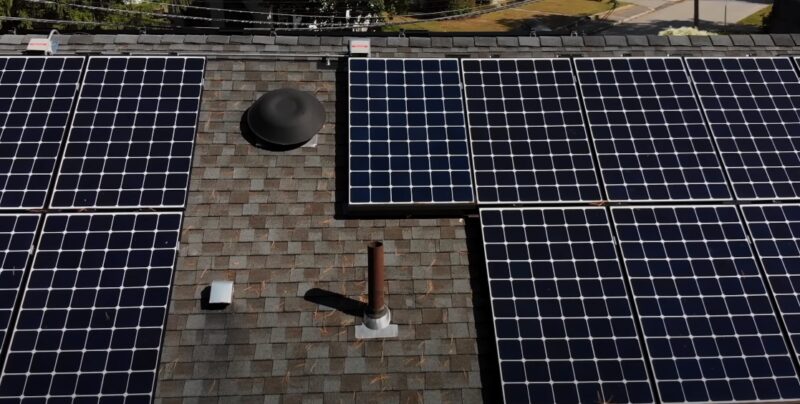
Safety is essential, especially during a power outage. Let’s explore the key safety measures to keep in mind.
Electrical Safety
Working with electricity poses risks, particularly when dealing with solar panels and battery systems. Ensuring all installations and maintenance are performed by qualified professionals is crucial.
- Professional Checks: Regular inspections by certified technicians can prevent electrical hazards.
- Compliance with Regulations: Ensure your system meets all local electrical codes and standards.
Battery Safety
Batteries store a significant amount of energy and, if not handled correctly, can be dangerous. It’s important to understand the safety aspects of your battery storage.
- Proper Ventilation: Batteries, especially lead-acid types, need proper ventilation to prevent gas buildup.
- Regular Maintenance: Check battery connections and health periodically to prevent issues.
What About Expenses?
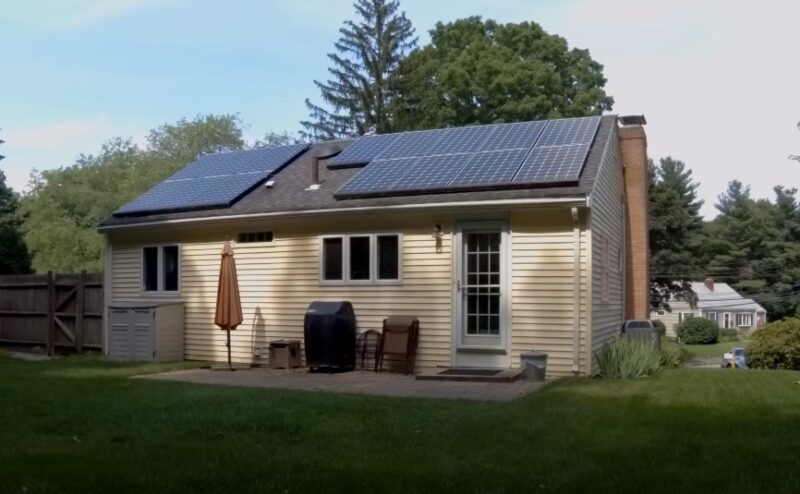
Investing in solar panels for power outages involves an initial cost but can offer long-term savings. This section breaks down the financial aspects.
Initial Investment and Long-Term Savings
The upfront cost of the system with battery storage can be significant. However, it offers long-term savings by reducing reliance on the grid and providing free solar energy.
- Government Incentives: Research available tax credits, rebates, and incentives to reduce initial costs.
- Energy Independence: Over time, the savings on electricity bills can offset the initial investment.
Return on Investment
The return on investment (ROI) can vary based on several factors including energy usage, system size, and local electricity rates.
- Reduced Energy Bills: Savings on electricity bills contribute to the ROI.
- Increased Property Value: Solar panels can increase the value of your property.
We Expect Further Development
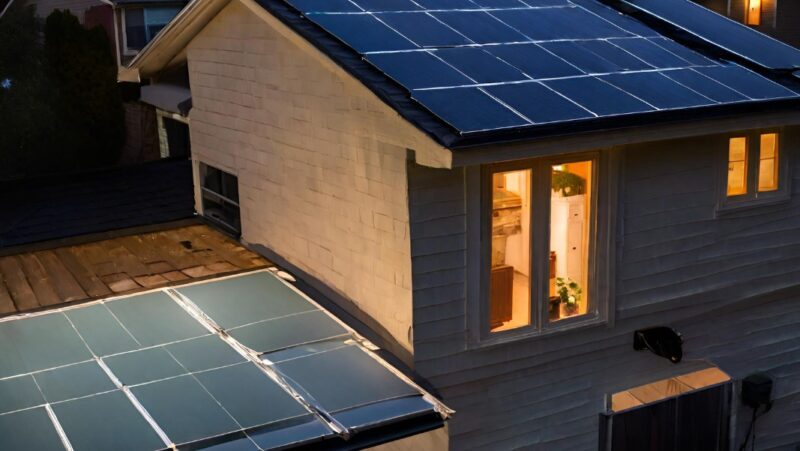
As technology advances, the role of solar energy in managing power outages is expected to grow. Here’s a glimpse into what the future may hold.
Technological Advancements
Advancements in solar technology, battery storage, and smart energy management systems are making solar energy more efficient and reliable during power outages.
- Innovations in Solar Panels: New technologies are improving the efficiency and durability of solar panels.
- Battery Technology: Developments in battery technology are increasing storage capacity and lifespan.
Renewable Energy Trends
The trend towards renewable energy sources is likely to continue, with solar energy playing a key role. This shift is driven by environmental concerns, technological improvements, and economic factors.
- Environmental Impact: Solar energy reduces reliance on fossil fuels, contributing to a reduction in greenhouse gas emissions.
- Economic Factors: As the cost of solar technology decreases, more homeowners are likely to adopt solar energy solutions.
FAQs
Can I use my solar panels to power my entire home during a power outage?
The ability to power your entire home during an outage depends on the size of your solar panel system and your battery storage capacity. Typically, solar systems are designed to cover essential loads like lighting, refrigeration, and communication devices. To power your entire home, you would need a significantly larger system with substantial battery storage.
How long will the solar batteries last during a prolonged power outage?
The duration for which solar batteries can provide power during an outage depends on the battery capacity, the energy efficiency of your home, and your usage patterns. Generally, a well-sized battery system can last for 24-48 hours if used for essential appliances. However, this can vary greatly based on specific circumstances.
Are solar panels still effective during cloudy or rainy weather?
Solar panels do generate electricity on cloudy or rainy days, but their efficiency is reduced. The exact reduction in power output depends on the cloud cover’s density. Modern solar panels are designed to be more effective in low-light conditions, but it’s important to consider these limitations when planning for power outages.
Do I need a special inverter to use my solar panels during a power outage?
Yes, to use solar panels during a power outage, you typically need a hybrid or off-grid inverter. Standard grid-tied inverters will shut off during an outage for safety reasons. Hybrid inverters can isolate your system from the grid and safely direct power from your panels and batteries to your home.
Can I add a battery to my existing solar panel system for outage use?
In most cases, you can add a battery to your existing solar panel system. However, it’s important to ensure compatibility between the battery, the solar panels, and the inverter. Consulting with a solar energy professional is recommended to determine the best options for your specific system.
How does net metering work during a power outage?
During a power outage, net metering is typically not functional. Net metering involves sending excess electricity back to the grid in exchange for credits. Since the connection to the grid is severed during an outage for safety, your system will not send power back, nor will it accrue credits during this time. Your system will only power your home if it has battery storage or an off-grid setup.
Summary
Solar panels provide a sustainable and reliable source of energy during power outages. By understanding your system, preparing properly, and managing energy use, you can maintain electricity when the grid fails.
The future looks bright for solar energy as advancements in technology continue to enhance its efficiency and reliability. Investing in solar panels not only prepares you for power outages but also contributes to a greener, more sustainable future. If you want to learn more about different types of energy sources, renewables, and other topics in the same area, stay with us at Csl Forum.
